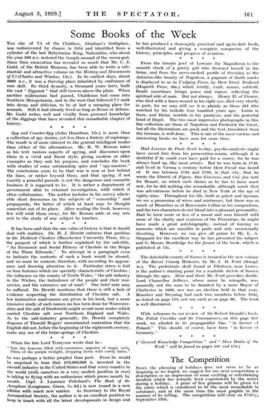Some Books of the Week
Tea site of Ur of the Chaldees, Abraham's birthplace, was rediscovered by chance in 1854 and identified from a cylinder of the last Babylonian King, Nabonidus, who about the year 580 B.C. restored the temple-mound of the moon-god. Since then excavation has revealed so much that Mr. C. J. Gadd, of the British Museum, has been able to write a sub- stantial and attractive volume on the History and Monuments of Ur (Chatto and Windus, 15s.). In its earliest days, about 3000 B.C., it was a thriving place inhabited by craftsmen of rare skill. Its third dynasty, a thousand years later, built the vast " Ziggurat " that still towers above the plain. When another millennium had passed, Chaldeans had come into Southern Mesopotamia, and in the wars that followed Ur sank into decay and oblivion, to be at last a camping place for nomads. Still it had already lived as long as Rome or Athens. Mr. Gadd writes well and vividly from personal knowledge of the diggings that have revealed this remarkable chapter of history.


































 Previous page
Previous page